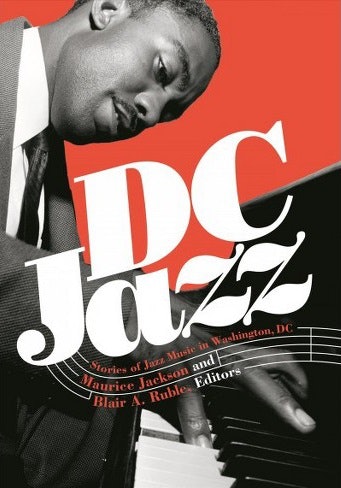As a historian who happens to have an affinity for jazz, Dr. Maurice Jackson of Georgetown University combines both in a book that explores the America-born musical genre’s presence in Washington, D.C. and its intersections with government, politics, race, religion and higher education.
Howard University and the University of the District of Columbia have played key roles in jazz education and appreciation and today serve as leading institutions in the study and performance of the art form. Those stories and others are told in DC Jazz: Stories of Jazz Music in Washington, DC, which Jackson co-edited with Dr. Blaire A. Ruble, a distinguished fellow at the Woodrow Wilson International Center for Scholars.
The nation’s capital as a key location in the evolution of jazz has largely been unknown, but not to those familiar with D.C. history, says Jackson, an associate professor of history and African American Studies.
“It was a big thing here,” says Jackson. “There were venues and clubs, and there was music in schools. D.C. had so much talent. Like ‘Buck’ Hill. The great Shirley Horne. So many others. But you’ve got to go to New York to make it.”
That’s what some did, earning fame and fortune. Others returned or simply stayed in D.C. Numerous people and places in the district were key to creating the jazz story, including the Library of Congress and Kennedy Center with concerts; Ahmet and Nesuhi Ertegun, sons of a Turkish diplomat and co-founders of Atlantic Records who fell in love with jazz and helped spread it around the world; Billie Holiday singing the hauntingly metaphorical anti-lynching song “Strange Fruit” at a club on U Street; and the ascent of native son Duke Ellington as one of the greatest jazz musicians of all time.
The book’s origins go back about five years, when Jackson suggested an issue on jazz in D.C. to Washington History, a scholarly journal published by the Historical Society of Washington, D.C. The special issue was published in spring 2014 and contained articles by Jackson and Ruble.
Jackson invited Ruble to co-edit a comprehensive book on the topic, and Georgetown University Press published DC Jazz in 2018. The jazz studies programs and jazz ensembles at Howard and UDC, as well as other initiatives such as UDC’s Felix E. Grant Jazz Archives and JAZZAlive events, illustrate the role of higher education in promoting the study and appreciation of jazz.














